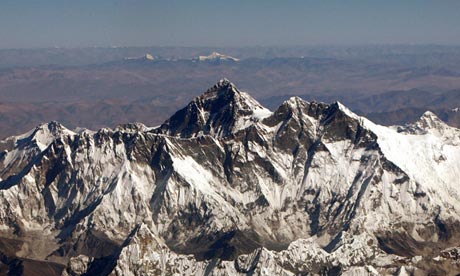Source google.com.pk
Mount Everest
Valery Rozov, a Russian daredevil, claimed a world base jumping record in a leap off the north face of Mount Everest in a special wingsuit earlier this month.
Red Bull, which sponsored the feat, released harrowing video of the May 5 jump on Wednesday.
The feat was timed to mark the 60th anniversary of the first ascent of the world's most famous mountain.
Rozov, 48, claimed the record for the world's highest-ever base jump, at 7,220 meters above sea level.
In the special wingsuit, he glided for a full a minute in the thin mountain air, reaching speeds up to 125 mph, before landing at a glacier at 5950 meters.
"Because the cliff at the top was not very high, the initial moments of the leap in the rarified high altitude air were the most critical phase," according to Red Bull's website. "Rozov needed more time than usual in the thin air to transition from freefall to flying."
Rozov, who has made over 10,000 jumps, planned the jump for two years. It took four days to climb from base camp to the jump location, assisted by a team of four Sherpas.
"Only when I got back home did I see how hard it was for me both physically and psychologically," Rozov said.
In previous stunts, Rozov jumped into an active volcano on the Kamchatka Peninsula in Russia's Fast East in 2009. In 2012, in a warmup for the Mount Everest leap, he jumped from 6,420 meters from Shivling in the Himalayas.
On May 15, 2006, a mere 300 metres from the summit of Everest, David Sharp sat just off the climbing route dying, starved of oxygen, slowly drowning as his lungs filled with his own fluids while his arms and legs gradually turned to ice.
While horrific, this was not an uncommon way to die in the Everest “death zone”. What disturbed the world was that approximately 40 climbers ignored this man’s plight as they made their way to the summit. Strong criticism of the unwillingness of climbers in commercial groups to help other climbers in life-threatening situations first emerged in the 1990s, led by Sir Edmund Hillary. It then stepped up in response to Sharp’s lonely death.
The sheer number of books and media reports on the subject would suggest that something is very wrong with the attitudes of modern climbers, and that commercialisation of the Everest climb is to blame.




Mount Everest
Valery Rozov, a Russian daredevil, claimed a world base jumping record in a leap off the north face of Mount Everest in a special wingsuit earlier this month.
Red Bull, which sponsored the feat, released harrowing video of the May 5 jump on Wednesday.
The feat was timed to mark the 60th anniversary of the first ascent of the world's most famous mountain.
Rozov, 48, claimed the record for the world's highest-ever base jump, at 7,220 meters above sea level.
In the special wingsuit, he glided for a full a minute in the thin mountain air, reaching speeds up to 125 mph, before landing at a glacier at 5950 meters.
"Because the cliff at the top was not very high, the initial moments of the leap in the rarified high altitude air were the most critical phase," according to Red Bull's website. "Rozov needed more time than usual in the thin air to transition from freefall to flying."
Rozov, who has made over 10,000 jumps, planned the jump for two years. It took four days to climb from base camp to the jump location, assisted by a team of four Sherpas.
"Only when I got back home did I see how hard it was for me both physically and psychologically," Rozov said.
In previous stunts, Rozov jumped into an active volcano on the Kamchatka Peninsula in Russia's Fast East in 2009. In 2012, in a warmup for the Mount Everest leap, he jumped from 6,420 meters from Shivling in the Himalayas.
On May 15, 2006, a mere 300 metres from the summit of Everest, David Sharp sat just off the climbing route dying, starved of oxygen, slowly drowning as his lungs filled with his own fluids while his arms and legs gradually turned to ice.
While horrific, this was not an uncommon way to die in the Everest “death zone”. What disturbed the world was that approximately 40 climbers ignored this man’s plight as they made their way to the summit. Strong criticism of the unwillingness of climbers in commercial groups to help other climbers in life-threatening situations first emerged in the 1990s, led by Sir Edmund Hillary. It then stepped up in response to Sharp’s lonely death.
The sheer number of books and media reports on the subject would suggest that something is very wrong with the attitudes of modern climbers, and that commercialisation of the Everest climb is to blame.
Mount Everest

Mount Everest
Mount Everest

Mount Everest
Mount Everest

Mount Everest


No comments:
Post a Comment